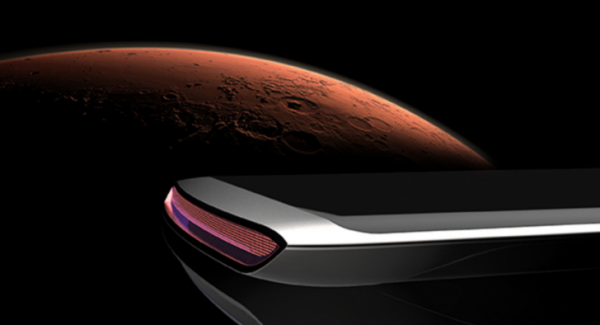When it comes to flagship smartphones these days, a lot of the specs are quite predictable, with many companies defaulting to the latest Snapdragon processor, anywhere between 4 and 6GB of RAM, a 1440p display and 32GB of storage. However, it looks like Turing Robotics wants to really break the mould with its future flagship, which boasts dual Snapdragon 830 processors, 12GB of DDR4 RAM, 1TB of storage and even an iMAX 6K camera.
The device is known as the Turing Phone Cadenza and judging by its proposed spec sheet, it is the most powerful smartphone ever. While Qualcomm hasn't officially launched the Snapdragon 830 just yet, the Cadenza promises to pack two of them whenever it launches.
If that wasn't enough, you will also find 12GB of DDR4 RAM (6GBx2), and two 256GB main storage devices, alongside two 256GB microSD cards, bringing the total storage to over 1TB.
A lot of smartphone makers like to make a big deal out of the camera but the Cadenza promises to out-do them all with a 60-megapixel quad rear camera with support for iMAX 6K resolution. If you happen to be into selfies, there will also be two 20 megapixel front facing cameras. You'll be able to view those pictures and videos on a 5.8-inch 1440p display.
This is all packed inside of a Graphene Oxide body, which also has room for four SIM cards and even three batteries to keep everything powered. It isn't an Android device, instead Turing has opted to use Swordfish OS, which doubles as a Deep Learning AI. Essentially, this is a pocket-sized super computer.
Given that some of the components used aren't available yet, the Cadenza doesn't have a release date, but Turing hopes to get it out sometime next year. Expect it to be very expensive.
KitGuru Says: It can be difficult to really get excited about the smartphone market these days, which makes something like this all the more interesting to see as it really pushes things forward, rather than being a predictable, iterative release. Still though, something like this is going to be out of reach, and perhaps not even all that useful for many regular consumers.
 KitGuru KitGuru.net – Tech News | Hardware News | Hardware Reviews | IOS | Mobile | Gaming | Graphics Cards
KitGuru KitGuru.net – Tech News | Hardware News | Hardware Reviews | IOS | Mobile | Gaming | Graphics Cards




That looks cool but without Android it’s dead in the water. Android is open source, why couldn’t they have just forked from it just for app compatibility? What good is a phone these days without apps?
the swordfish OS is based off the sailfish OS which has many apps already. from what Ive seen of sailfish in someways its a more advanced OS than android. because most android apps run on it.
”Sailfish, in addition to its native applications, is able to run most Android ones. Problems can arise if these applications were coded without following Android standards about controls, which might not display correctly and so become unusable. Built-in Alien Dalvik plays the role of an Android compatibility layer. It emulates, but does not simulate, Android OS, and the environment is recognized as such by Android software, which thus runs at native speed without any perceivable performance slow-down. Sailfish multitasking is always enabled by the nature of Linux, and this allows running both native Sailfish and Android software simultaneously, while the user can switch between them on the fly.[47]
”
Didn’t realise it was based on Sailfish. That’s not too bad then. Should be an interesting device in that case.
Why? Seriously, why do you need that much power in a phone?
I personally work on my phone, I just plug a monitor & keyboard to it. It’s more convenient than a laptop, with more features & often cheaper prices. Though I’ll agree only a stupidly small amount of people actually do that.
Sounds awesome!
will it even fit my hand? XD
More features and cheaper than a laptop? What type of features, because for my work I really could never use a phone. Not to mention that most high end phones are less powerful than my laptop and cost roughly the same (this baby will probably cost a lot more than what you’d pay for a laptop equivalent). Also, it seems anything but convenient if you want to work on the road or anywhere that is not an/your office. Would a tablet not make a lot more sense? Like you say, it’s a niche no doubt, but other than portability, I don’t see the advantage of a phone over a laptop or tablet (or hybrid of the two).
More features as in, you can text and call with it, use it as a gps in a car, listen to music while walking. You *could* do it with a laptop, but it wouldn’t be very convenient. Same with a tablet.
My work is programming, so I really need just enough power to run an IDE, build/compile and have some simulators running (little operating systems). On top of that I usually have billions of tabs open on a browser and some softwares that are light but still needs to run in parallel. I don’t need the ultimate power, I just need enough to run all that comfortably. A laptop clearly is enough and would allow me to work in a plane or a car or at the beach. That’s not my intent. I leave a keyboard, a monitor and a mouse where I intend to work, and just plug my phone and use it as a “portable desktop”.
All in all, what you’re saying is entirely right, but while I will buy a smartphone anyways, which would be about 400€ for my simplistic uses (ballpark), I won’t mind puttin 400€ extra for, say, a samsung s6, and not having to buy a laptop.
If I did not need a smartphone in the firstplace I could satisfy myself with a dumbphone and would spend the money on an actual laptop.
Also, tablet would work the same, so, i’d rather have the smaller version, a phone. So really your argument is valid, I just use the “I’m buying a smartphone anyways, might as well skip the laptop then” and portability argument, which I think makes it cheaper in the end.
Whilst some people would love a high-end phone. This one seems so extreme as to be maximising the hardware specs purely for the point of having specs people can boast about rather than actually use…
The cameras especially, 60MPixel camera plus twin 20MP selfie ones with smartphone-scale micro lenses? Seems far beyond excessive and largely pointless…
Makes sense to me 🙂
Do you run a custom OS as well, or does Android suffice? Cause I can imagine that you cannot run all the software you need on a mobile OS.